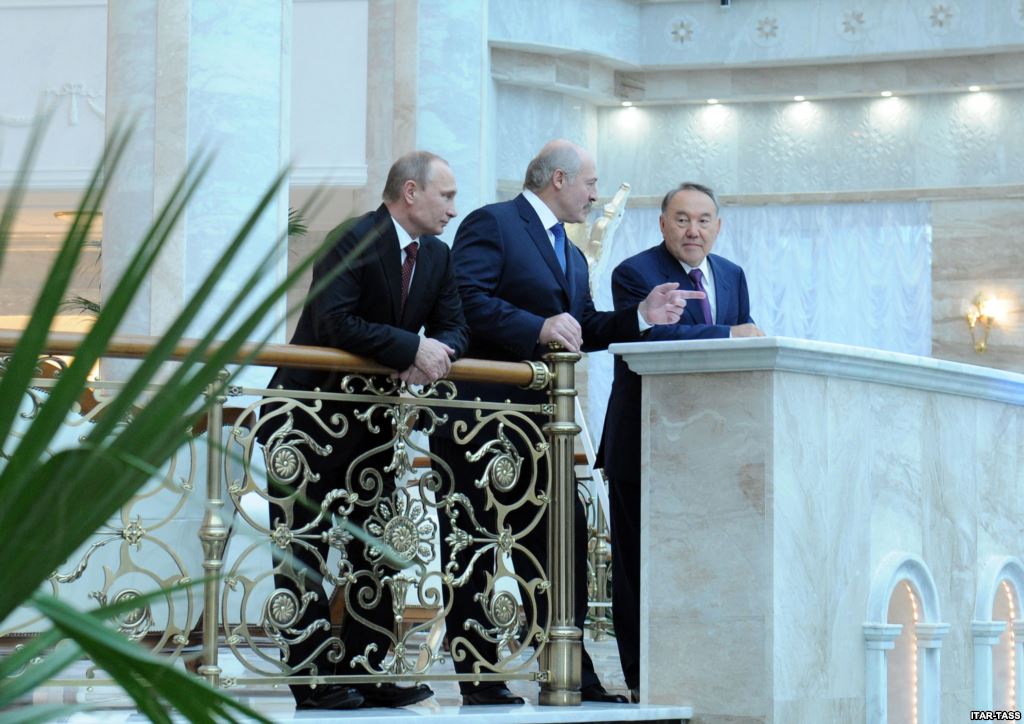
Russia’s Eurasian Integration Projects Threatened by Internal Dissent
Publication: Eurasia Daily Monitor Volume: 10 Issue: 199
By:

On October 24 and 25, Belarus hosted two high-level meetings of heads of state of the Supreme Economic Council of the Eurasian Economic Community (EurAsEc) and the Commonwealth of Independent States (CIS). While these gatherings enabled their participants to discuss a wide range of issues regarding their respective countries’ relations with one another on the political, economic and security fronts, economic integration was by far the most important item on the agenda. To nobody’s surprise, Kazakhstan, Russia and Belarus, which have been participating in a customs union since July 2010 and created as of January 2012 a common economic space, pledged their continuous support to the progressive establishment of the Eurasian Union. It is currently expected that the founding treaty of this new supranational organization will be signed by the end of next year, with its final draft slated to be made public as early as May 2014 (Lenta.ru, October 24).
As Moscow, Minsk and Astana are keen on further deepening their economic partnership, the Russia-led Customs Union—the precursor to the Eurasian Union—is also mulling over the possibility of accepting new members. Thus, during his visit to the Kremlin on September 3, Armenian President Serzh Sargsyan publicly declared his country’s strong intention to join the trilateral Customs Union. This statement was actually made as Yerevan was thought to be conducting final preparations before the signing of an association agreement with the European Union later in November (see EDM, September 5, 6, 11). While such a move can be safely considered a part of Russia’s geopolitical game in the South Caucasus, where Armenia and Azerbaijan are still bitterly divided over Karabakh, it is also clear that Yerevan’s energy dependence vis-à-vis Moscow made its bargaining position hardly tenable. In fact, the country’s energy minister, Armen Movsissyan, openly admitted on November 5 that by joining the Customs Union, Armenia could secure preferential purchase terms in its long-term gas deals with Russia (1news.az, November 5; Regnum.ru, September 3).
Kyrgyzstan is another post-Soviet state whose eventual participation in the Customs Union as a full-fledged member is now seriously being examined in the three capitals. The Kyrgyz Republic’s government is currently finalizing an accession roadmap to be approved by the presidents of Russia, Kazakhstan and Belarus by the end of 2013. However, as Kyrgyzstan’s Deputy Economy Minister Oleg Pankratov said this August, it is highly unlikely that Bishkek will be able to join the three-country bloc before 2015. While both Armenia and Kyrgyzstan are at the very early stages of accession talks and would still have to ratify over 40 agreements in order to become fully eligible, Vladimir Putin’s Eurasian Union is increasingly portrayed as a truly Eurasian project. Speaking at the recent Minsk summit, Kazakhstani President Nursultan Nazarbayev admitted that Turkish President Abdullah Gul had privately requested for him to consider Ankara’s candidacy for membership, and Putin himself spoke about India’s growing interest in entering into a free trade agreement with the Customs Union. Furthermore, Syria’s Deputy Prime Minister Qadri Jamil also mentioned his country’s desire to join the Customs Union, on a visit to Moscow on October 29 (Tengrinews.kz, October 29; Rosbalt.ru, October 26; Lenta.ru, October 24; Newsland.com, August 7).
While the accession of new members remains problematic for a number of reasons—including Syria’s internal chaos, Kyrgyzstan’s chronic political instability and Armenia’s economic weakness, let alone China’s potential resistance to India’s trade projects in Central Asia—these talks are still viewed in Moscow as proof of Russia’s successful leadership. However, today’s relations between the current members of the Customs Union, which would naturally become the core of the forthcoming Eurasian Union, should it be finally established, seem less than idyllic. In his Minsk speech, Nursultan Nazarbayev heavily criticized the work of the Eurasian Commission, accusing this executive body of the Customs Union of being too politicized and taking orders directly from the Russian government, instead of demonstrating complete impartiality. While the Customs Union should focus, in Nazarbayev’s words, on implementing the already-signed agreements in such areas as oil and gas, railway transport, or electricity, Kazakhstan’s president disparaged the Commission’s tendency to make unjustified proposals about extending its own powers (Bgd.by, October 24).
Moreover, Nazarbayev put into question the very efficacy of the Customs Union, whose fundamental goal has been to promote cross-border trade and create better conditions for both small and large businesses. According to Nazarbayev, Kazakhstan imported in January–July 2013 three times more from Russia than the total volume of its exports to this country, whereas Kazakhstan’s imports from Belarus exceeded exports by a factor of eight during the same timeframe. The Kazakhstani leader also criticized multiple non-tariff barriers, including excessively strict sanitary requirements, which prevent his country’s products from entering the Russian market, before openly denouncing Russia’s repeated attempts to block its electricity sales to Minsk via Russian territory. On October 11, Belarusian President Alyaksandr Lukashenka went on record to say that if Russia did not scrap its customs duties applicable to oil products before January 2014, Minsk would be compelled to quit the Customs Union. Earlier in August, Lukashenka already vented his ire against Moscow’s presumed policy of discrimination targeting his country’s agricultural producers (Inform.kz, Neftegaz.ru, October 24; Glavcom.ua, August 18).
In this context, Vladimir Putin solemnly promised on October 24 to study the possibility of cancelling duties on traded oil, in exchange for similar gestures on behalf of both Belarus and Kazakhstan. As these two countries appear increasingly dissatisfied with the results of their membership in a close economic cooperation scheme with Russia, Moscow may thus be led to become less abrasive and seek new ways to accommodate its interlocutors. However, even if such a change takes place, the current international situation is hardly favorable to the implementation of Putin’s grandiose plans. At a time when Russia’s economy is balancing on the verge of a recession, Kazakhstan’s growth prospects seem weaker than two years ago, as its economy is now more closely tied to Russia’s than before. Meanwhile, Belarus’s economy remains dependent on Russian subsidies across a number of sectors. Finally, an eventual power transition in either of these two countries could be a serious challenge to Russia’s long-term projects (Neftegaz.ru, October 24).




